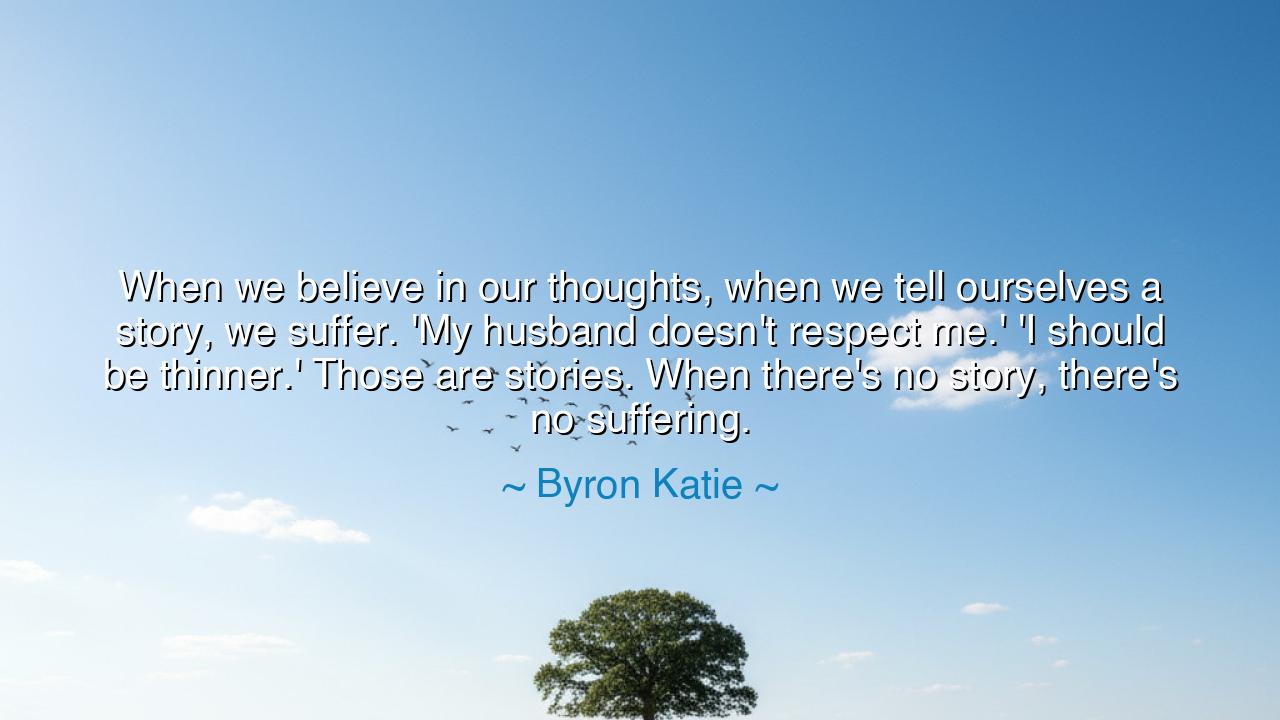
When we believe in our thoughts, when we tell ourselves a story
When we believe in our thoughts, when we tell ourselves a story, we suffer. 'My husband doesn't respect me.' 'I should be thinner.' Those are stories. When there's no story, there's no suffering.






Byron Katie, the teacher of radical clarity, once declared: “When we believe in our thoughts, when we tell ourselves a story, we suffer. 'My husband doesn't respect me.' 'I should be thinner.' Those are stories. When there's no story, there's no suffering.” These words strike like a blade cutting through illusion. They remind us that much of our torment does not come from reality itself, but from the stories we weave around reality—stories of judgment, expectation, and self-condemnation. When we cling to these tales, we imprison ourselves. But when we release them, peace enters, for truth is simpler than the tangled webs of thought.
The origin of this teaching lies in Byron Katie’s own life. She once lived in despair, overcome by depression, anger, and self-loathing. But in a moment of awakening, she saw that her suffering was not born from the world itself, but from the thoughts she believed about the world. From this realization came “The Work,” her process of questioning thoughts until their power dissolved. What she offers in this quote is the distilled essence of her revelation: suffering is not reality—it is the story we believe about reality.
The ancients, too, saw this truth. The Stoics taught that men are not disturbed by events themselves, but by their judgments of events. Epictetus said, “It is not what happens to you, but how you think about it, that matters.” The Buddha declared that attachment to thought and desire is the root of suffering, and liberation comes when one releases clinging. In all traditions, the same wisdom shines forth: the mind creates chains with its stories, and freedom begins when the stories are questioned and abandoned.
History gives us vivid examples. Consider Viktor Frankl, imprisoned in the concentration camps of the Second World War. His suffering was unimaginable, yet he discovered that even in horror, the power of choice remained: he could not control the cruelty around him, but he could control the meaning he gave it. He refused to weave the story of despair, and instead chose the story of dignity, survival, and service to others. His example reveals the heart of Byron Katie’s teaching: when the mind ceases to imprison itself in false narratives, even in darkness, a measure of freedom is possible.
The lesson is clear: beware of the stories you tell yourself. When you say, “I am not enough,” or “They do not respect me,” or “I must be different to be worthy,” you are binding yourself with cords of thought. These may feel like truth, but they are illusions. Life itself is often neutral, even simple—but the stories we tell about it magnify our suffering. By learning to question these stories, by asking whether they are truly real, we begin to dissolve pain and open to peace.
Practical actions flow from this wisdom. When a thought arises that causes pain, pause and examine it. Ask: “Is this true? Can I know beyond all doubt that it is true?” Notice how the thought feels in the body, how it creates suffering. Then ask: “Who would I be without this story?” In this simple practice, the grip of illusion loosens, and you return to the reality of the present moment. Replace judgment with inquiry, self-condemnation with compassion, and watch how the storm of the mind begins to calm.
Thus, O listeners, let Byron Katie’s words ring in your heart: “When there's no story, there's no suffering.” For life itself is not your enemy; it is the tales of judgment and expectation that make it so. To live free, you must learn to separate truth from story, reality from thought. This is the path to peace—not through control of the world, but through clarity of mind.
And remember this eternal truth: the mind will spin a thousand tales, but you are not bound to believe them. Release the story, and you release the suffering. Live in the present, and you live in freedom.






AAdministratorAdministrator
Welcome, honored guests. Please leave a comment, we will respond soon